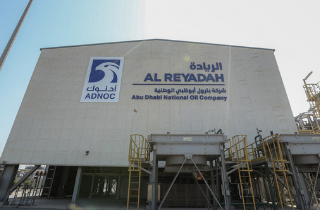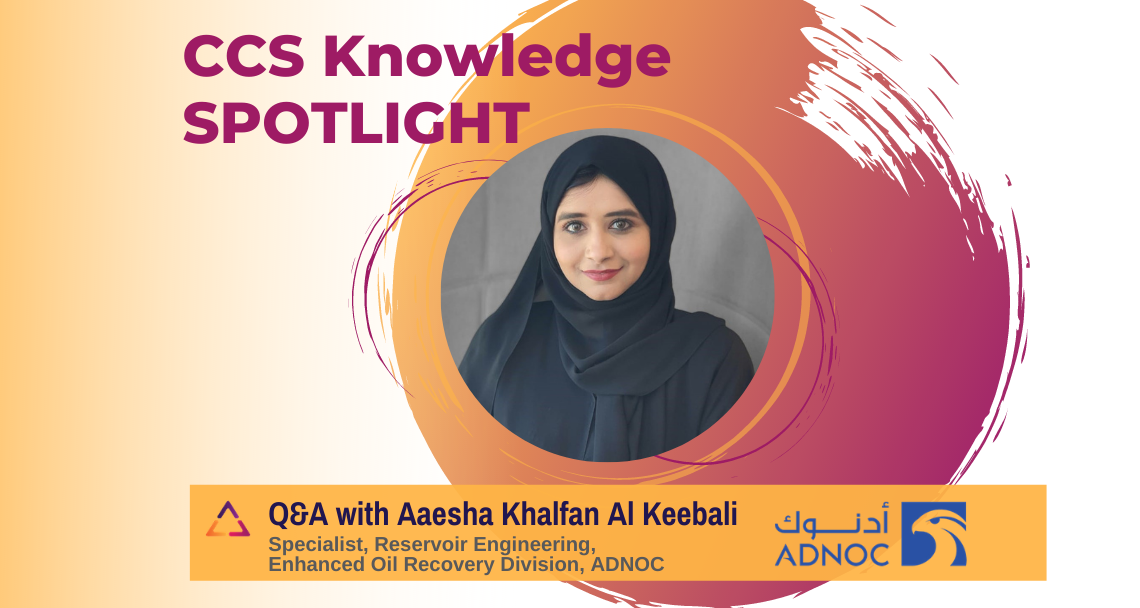We asked Aaesha Khalfan Al Keebali about what drives her and ADNOC in the carbon capture & storage (CCS) space and what they see as important and necessary right now. Here’s a hint – Aaesha reflects on the vital role of large-scale CCUS as a formidable solution to tackle climate change.
1. In your opinion, why does CCS matter?
Carbon capture technology is vital, both domestically here in the UAE but also internationally, I recently read the Global CCS Institute report on Net-Zero and Geospheric Return which states that global ‘CO2 emissions need to drop by 50% to achieve global climate goals.
In ADNOC, we are committed to pursuing innovative solutions to reduce our environmental impact and carbon footprint and I am proud to say that ADNOC is one of the least carbon intensive oil and gas companies in the world.
Currently, ADNOC captures 800,000 tons per year of CO2 from our Al Reyadah facility which is used in our operations to enhance oil recovery (EOR).
By 2030, ADNOC aims to expand its CCUS capacity by 500%, capturing 5 million tons of CO2 per annum– the equivalent of a forest more than twice the size of the UAE.
2. What role does CCS play in climate action for ADNOC and the UAE?
CCUS plays a vital part in ADNOC’s efforts to transition to a low carbon future. ADNOC has a clear CO2 deployment strategy, which together with our strategic partnerships, will enable us to expand our CO2 capture capacity 500% and reduce carbon intensity by 25% by 2030.
This strategy is at the heart of ADNOC’s commitment to being a responsible and reliable energy provider, balancing our objective to deliver energy to meet growing global oil demand, with our commitment to becoming best in class in sustainability.
I’m also proud that the UAE was among the first oil producing nations, and the first OPEC member, to sign the Paris Accord in 2015. More recently, speaking at the CERAWeek conference in March this year, our Group CEO, H.E. Dr Sultan Al Jaber again underlined ADNOC’s commitment by emphasizing how essential the adoption of CCS technology across the world is to reaching global climate change goals.
3. From your perspective, how does the use of CO2 for EOR support both environmental and economic sustainability?
Using CO2 in our enhanced oil recovery (EOR) operations enables ADNOC to significantly reduce its carbon footprint, unlock greater domestic natural gas supply, while also meeting growing oil demand.
In fact, ADNOC was the first company in the region to pilot CO2 for enhanced oil recovery (EOR) at our onshore Rumaitha field in 2009.
I’ve already mentioned our Al Reyadah facility which is the first commercial scale carbon capture plant in the Middle East and the world’s first fully commercial CO2 capture facility from the iron and steel industry. ADNOC currently captures 800,000 tons per year of CO2 from Al Reyadah which is used in EOR operations in our Bab and Rumaitha fields.
Today, ADNOC has ongoing onshore CO2 water and gas injection (WAG) pilots with CO2 EOR contributing significantly towards unlocking more value from every barrel and reducing our environmental impact.

4. How would you like to see CCS fit into circular economy on a global scale?
I believe that accelerating the scale-up of CCUS projects across global supply chains is a key element to achieving reduced greenhouse gas intensity across the world.
More integration and innovative solutions are needed to expedite cost-effective CO2 technologies, in order to develop economically viable and best-in-class low carbon strategies and projects.
5. What is your key piece of advice for those concerned about the viability of CCS?
My advice would be for organizations to leverage innovation, technology and strategic partnerships to achieve low cost CO2 capture techniques which enable them to optimize costs. Clearly for many governments and industries, cost and capital investment can be seen as an obstacle, but the importance of CCS technology in tackling climate change is clearer than ever, and I think it should be seen as an investment in our planet’s future.
6. How does ADNOC work to build partnerships and collaborations in the CCS space?
Collaboration and partnerships are key to realizing the potential and success of CCS. We work closely with leading companies, academic partners, individuals and governments in a range of areas in CCUS and sustainability.
For example, in 2020, ADNOC signed a strategic framework agreement with ENI and Total, part of which included a commitment to working together on new opportunities in CCUS, and exploring joint research, development and deployment opportunities in reducing CO2 emissions.
This year, the UAE and Japan agreed to cooperate on Fuel Ammonia and Carbon Recycling technologies. This agreement followed the signing of a Memorandum of Cooperation between ADNOC and the Japanese Ministry of Economy, Trade and Industry, highlighting the joint ambition of our countries to harness new commercially feasible technologies to reduce carbon emissions.
These are just some examples of how ADNOC is working in partnership with leading international organizations and Governments to leverage CCS technologies to achieve our goals.
7. Anything else that you would like to add?
In my view, CCUS technology will help us to reduce carbon emissions to mitigate climate change, which I feel is a global responsibility for every individual and organization.
What motivates me in my current role as a CCUS champion is my ability to contribute to ADNOC’s mission to drive sustainable economic value for the UAE and to protect the environment for generations to come.
Accelerating the deployment of carbon capture utilization and storage (CCUS) and achieving our CCUS targets, will enable us to realize this mission for the benefit of ADNOC, our nation and the world.

 News
News